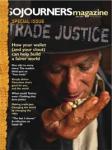"Making Work Work," by Tamara Draut, Paul Sherry, Gordon Bonnyman, Joan Fitzgerald, and Jill Suzanne Shook (February 2007) was a laudable endeavor to draw attention to the plight of working people in this country and the need for churches to participate in building a broad coalition between the working poor and the middle class. But there was a glaring omission: None of the articles highlighting this theme addressed the role of organized labor in this challenge.
Your articles rightly celebrate the gains of the living wage movement across the country, and their importance, but it is not well-known that labor unions are among the most active participants in this movement. In Los Angeles 11 years ago, clergy and lay activists who participated in the successful passage of the landmark living wage ordinance here decided to build upon their newfound ties with progressive elements of the labor movement. They founded Clergy and Laity United for Economic Justice, and today CLUE plays a key strategic role with such unions as UNITE HERE!, SEIU, and the grocery workers union (UFCW) in campaigns to organize hotel workers, grocery workers, security guards, Wal-Mart workers, and others. Last fall this movement was formally launched statewide as CLUE-California, with four key centers in the state now embarked upon a coordinated agenda.
Also, the Chicago-based Interfaith Worker Justice has a broad array of programs and projects related to work and organized labor, with more than 65 affiliated groups nationwide. This upsurge of national activity in the religious community on behalf of working people and the right to organize corresponds to the upsurge in union organizing in the service sector of work, which now comprises about 80 percent of all workers. Unions have long been recognized as instruments of justice that bring low-wage workers into the middle class.
Finally, we should be reminded that there is a long history of religion and labor as partners for justice—one that goes back to the struggles of industrial workers in the 1930s and beyond. In this moment we are seeing a renewal of that historic bond.
Rev. Richard W. (Dick) Gillett
Clergy and Laity United for Economic Justice
Pasadena, California

Got something to say about what you're reading? We value your feedback!